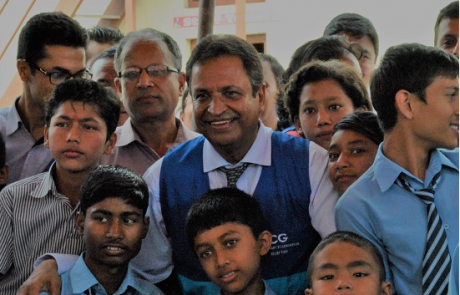The Globe and Mail Editor-in-Chief David Walmsley Appointed to Long Run Initiative (LRI) Board of Governors
The Long Run Initiative (LRI) is pleased to announce that Mr. David Walmsley, Editor-in-Chief of the Toronto The Globe and Mail Canada’s national newspaper, will be joining its international Board of Governors, effective immediately.
David brings a powerful and unique perspective to the LRI board. “On behalf of our Founder-Directors Professor John Turner and Dr. Michael Aldous, I am delighted to welcome David to the LRI,” Founder-Director Dr. Laurence B. Mussio said. “His career experience, his remarkable leadership in Canadian and international journalism and his intuitive understanding of the importance of connecting hindsight to insight about contemporary challenges makes him a perfect addition to the LRI.”
Uniquely among LRI Governors, David has connections to both city reference points of the LRI – Belfast and Toronto. Indeed, his late father George was Dean of Science and Agriculture at Queen’s University, Belfast (2003). David began his journalism career at The Belfast Telegraph in 1992. He was named young journalist of the year for Northern Ireland in 1995 for investigative work. He worked as a reporter and editor at a series of market-leading news organisations in Scotland and London before moving to Canada and assuming the leadership of The Globe and Mail. During his editorship, The Globe and Mail has twice won The Michener Award (Canada’s Pulitzer) for public service journalism.
David is the also chair of the non-profit Canadian Journalism Foundation and is a founding member of The Trust Project (Markkula Center for Applied Ethics, University of Southern California). In 2017 he created World News Day – a global initiative that puts the audience on stage to explain how journalism improved their lives, and in December 2019 David is to be appointed a board member of the World Editors’ Forum, Paris. He also sits on the advisory council of the digital media zone at Ryerson University and is a media member of the World Economic Forum, Davos.
Included in David’s UK reporting was his role as Associate Producer of the Cutting Edge Channel 4 documentary (UK) The Final Flight of Zulu Delta 576 (1997). He was also contributing author to the anthology Reporting the Troubles (2018). Sir Harold Evans, the veteran editor and author, has described Walmsley as “the Man Who Might Save Newspapers” (Town and Country magazine, Sept 2016).
On behalf of the LRI, please join us in welcoming David to the Board of Governors.











